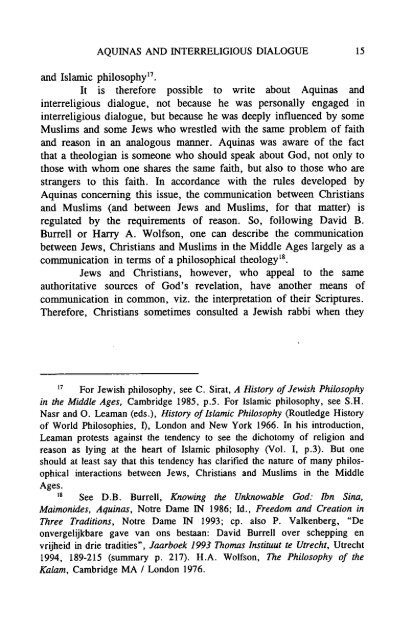Jaarboek Thomas Instituut 1997 - Thomas Instituut te Utrecht
Jaarboek Thomas Instituut 1997 - Thomas Instituut te Utrecht
Jaarboek Thomas Instituut 1997 - Thomas Instituut te Utrecht
You also want an ePaper? Increase the reach of your titles
YUMPU automatically turns print PDFs into web optimized ePapers that Google loves.
AQUINAS AND INTERRELIGIOUS DIALOGUE 15<br />
and Islamic philosophy".<br />
It is therefore possible to wri<strong>te</strong> about Aquinas and<br />
in<strong>te</strong>rreligious dialogue, not because he was personally engaged in<br />
in<strong>te</strong>rreligious dialogue, but because he was deeply influenced by some<br />
Muslims and some Jews who wrestled with the same problem of faith<br />
and reason in an analogous manner. Aquinas was aware of the fact<br />
that a theologian is someone who should speak about God, not only to<br />
those with whom one shares the same faith, but also to those who are<br />
strangers to this faith. In accordance with the rules developed by<br />
Aquinas concerning this issue, the communication between Christians<br />
and Muslims (and between Jews and Muslims, for that mat<strong>te</strong>r) is<br />
regula<strong>te</strong>d by the requirements of reason. So, following David B.<br />
Burrell or Harry A. Wolfson, one can describe the communication<br />
between Jews, Christians and Muslims in the Middle Ages largely as a<br />
communication in <strong>te</strong>rms of a philosophical theology".<br />
Jews and Christians, however, who appeal to the same<br />
authoritative sources of God's revelation, have another means of<br />
communication in common, viz. the in<strong>te</strong>rpretation of their Scriptures.<br />
Therefore, Christians sometimes consul<strong>te</strong>d a Jewish rabbi when they<br />
17 For Jewish philosophy, see C. Sirat, A History of Jewish Philosophy<br />
in the Middle Ages, Cambridge 1985, p.5. For Islamic philosophy, see S.H.<br />
Nasr and O. Leaman (eds.), History of Islamic Philosophy (Routledge History<br />
of World Philosophies, I), London and New York 1966. In his introduction,<br />
Leaman pro<strong>te</strong>sts against the <strong>te</strong>ndency to see the dichotomy of religion and<br />
reason as lying at the heart of Islamic philosophy (Vol. I, p.3). But one<br />
should at least say that this <strong>te</strong>ndency has clarified the nature of many philosophical<br />
in<strong>te</strong>ractions between Jews, Christians and Muslims in the Middle<br />
Ages.<br />
18 See D.B. Burrell, Knowing the Unknowable God: Ibn Sina,<br />
Maimonides, Aquinas, Notre Dame IN 1986; Id., Freedom and Creation in<br />
Three Traditions, Notre Dame IN 1993; cp. also P. Valkenberg, "De<br />
onvergelijkbare gave van ons bestaan: David Burrell over schepping en<br />
vrijheid in drie tradities", <strong>Jaarboek</strong> 1993 <strong>Thomas</strong> <strong>Instituut</strong> <strong>te</strong> <strong>Utrecht</strong>, <strong>Utrecht</strong><br />
1994, 189-215 (summary p. 217). H.A. Wolfson, The Philosophy of the<br />
Kalam, Cambridge MA I London 1976.








